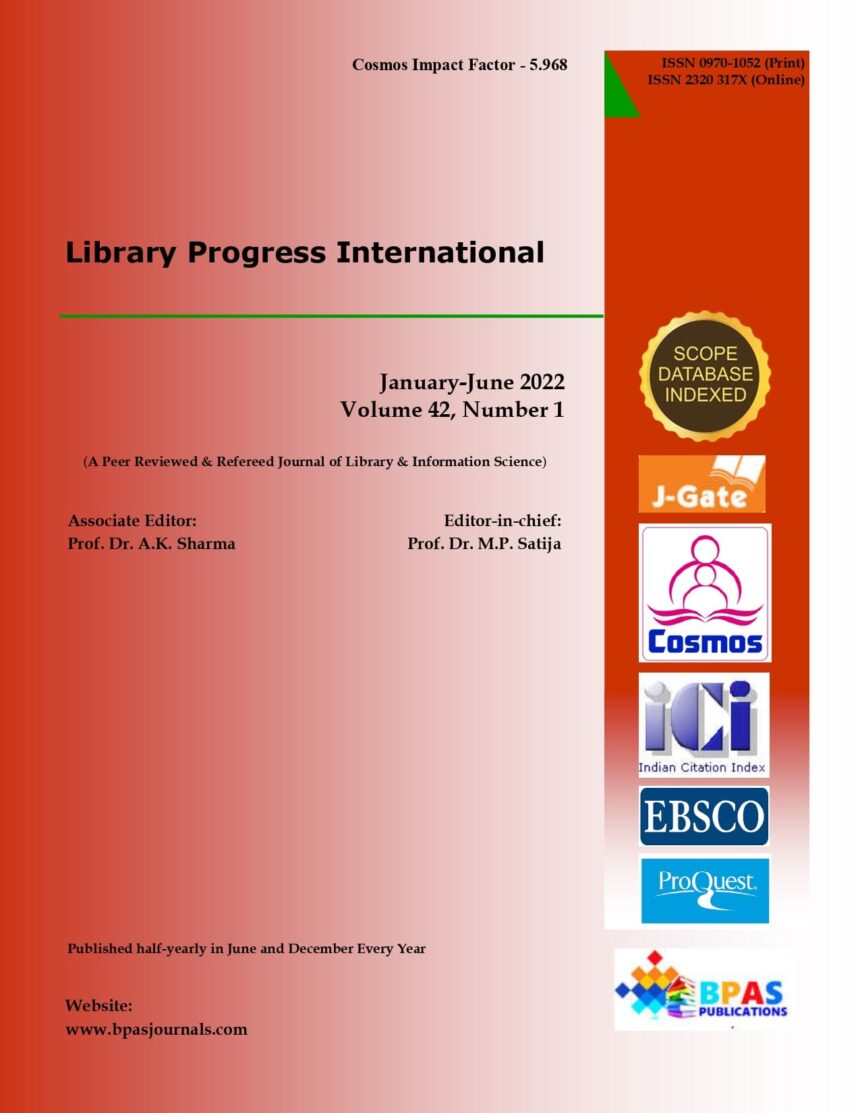Basic Skills Needed in Continuing Professional Development of Librarians in Nigeria
DOI:
https://doi.org/10.48165/Keywords:
Continuing education, Professional development, Librarians, NigeriaAbstract
Aim: The study investigated continuing professional development of librarians and basic skills mostly needed in 10 academic libraries in Delta State, Nigeria. Methods: The investigation employed descriptive survey design. The population for the study comprised of 70 Academic librarians. The questionnaire was the instrument that was employed in data collection. However, 63 questionnaires were returned and used as the sample size. Analysis was done using mean statistics. Results: The study revealed that the mostly needed skills are effective communication skills, technical skills, computer literacy and information seeking skills, while the mostly used methods in the professional development of librarians are conferences, seminars, workshops and short courses. The challenges include poor attitude of library staff to continuing professional development initiatives (waiting to be sent) amongst others. Conclusion: Improvement of attitude of library staff and Library Management, collaboration between Nigerian Library Association and Nigerian Library Registration Council were adduced as solutions to the problems.
Downloads
References
Adomi, E. E., & Anie, S. O. (2006). An assessment of computer literacy skills of professionals in Nigerian University libraries. Library Hi Tech News, 23(2), 10- 14.
Ahmad, P., & Yaseen, M. (2009). The role of the library and information science professionals as managers: A comparative analysis.
southernlibrarianship.icaap.org/content/ v10n03/ahmad_p01.htmlAkiny
Aileen, k. (2005). Models of continuing professional development: A framework for analysis. https://www.tandfonline.com/doi/pdf/
1080/13674580500200277
Alison, D. (2020). Communication skills for workplace success.
https://www.thebalancecareers.com/com munication-skills-list-2063779
Anunobi, C. V., Nwakwuo, O. P., Oga, M., & Benard, I. I. (2011). The adoption of ICT for library and information services. Nigerian Libraries, 44(1), 89-104.
Australian Library and Information Association (2014). The Library and information sector: Core knowledge, skills and attributes. https://www.alia.org.au/about
alia/policies-standards-and
guidelines/library-and-information sector-core-knowledge-skills-and
attributes
Benson, A., & Favini, R. (2006). Evolving Web, evolving librarian. Library Hi Tech News, 23(7), 18-21.
Blair, G. M. (2009). Presentation skills: Basic management skills. University of Edinburgh, School of Engineering. http://www.see.ed.ac.uk/~gerard/Mana
gement/art1.html
Business Dictionary (2018). Continuing professional development. http://www.businessdictionary.com/defi nition/Continuing-Professional
Education-CPE.html
Careeroverview (2011). Librarian career and job description. http://www.careeroverview.com/libraria n-careers.html
Choi, Y., & Rasmussen, E. (2006). What is needed to educate future digital librarians: A study of current practice and staffing patterns in academic and research libraries. Doi:10.1045/september2006-choi
Cortez, E., Bbritz, J., & Kingongo-bukeny, I. (2008). Strategies for continuing professional development of LIS faculty in Sub-Saharan Africa. World Library and Information Congress, 74th IFLA General Conference and Council 10-14 August, Quebec, Canada.
Eze, C. O. (2009). Assessment of staff development programmes in college and polytechnic libraries in Anambra and Enugu States.
http://www.unn.edu.ng/publications/fil es/images/EZE,%20CELESTINE%20ONY EBUCHI.pdf
Francois C, 2020). What are the different types of professional development for educators?
https://www.wisegeek.com/what-are the-different-types-of-professional
development-for-educators.htm
Gerolimos, M., & Consta, R. (2008). Librarians' skills and qualifications in a modern informational environment. https://www.researchgate.net/publicatio
n/235278582_Librarians'_skills_and_quali fications_in_a_modern_informational_env ironment
Hannabuss, S. (2008). Librarianship and human rights: A twenty-first century guide. Journal of Librarianship and Information Science, 40(1), 59-60.
Harrison, R. (2010).Unique benefits of conference attendance as a method of professional development for LIS professionals.
https://doi.org/10.1080/0361526X.2010.4 89353
Heathfield, S. M. (2018). How on-the-job training brings you value. https://www.thebalancecareers.com/
Kosgei, K. K. (2015). Challenges facing staff development and training: A survey of secondary schools in Kericho County. http://www.ijhssi.org/papers/v4(2)/Ver
sion-1/E0421034047.pdf
Loose, C. (2020). Effective methods of professional development. http://doi:10.4018/978-1-7998-4622- 2.ch001
Nwodo, O. C., & Otokuneku, H. O. C. (2015). Contemporary challenges in the management of Nigerian University libraries: The way forward. Information Technologists, 12 (2), 107-115.
Ogbomo, E. F. (2011). Issues and challenges in the use of information communication technology in education. Information Impact: Journal of Information and Knowledge Management 2(1), 53-68.
Okojie,V., & Omotoso, O. (2013). Education and training of information professionals: the collaborative role of the Librarians’ Registration Council of Nigeria (LRCN). library.ifla.org/205/1/162- okojie-en.pdf
Ozioko, R. E., Echezona, R. I., & Osadebe, N. E. (2011). Mentoring as a strategy for continuing professional development for librarians in academic libraries in Nigeria. Nigerian Libraries 45(1): 14-27.
Reddy, K. I., & Jyothy, M. I. (2014). Management skills for library professionals in the digital era. www.researchgate.net/publication

